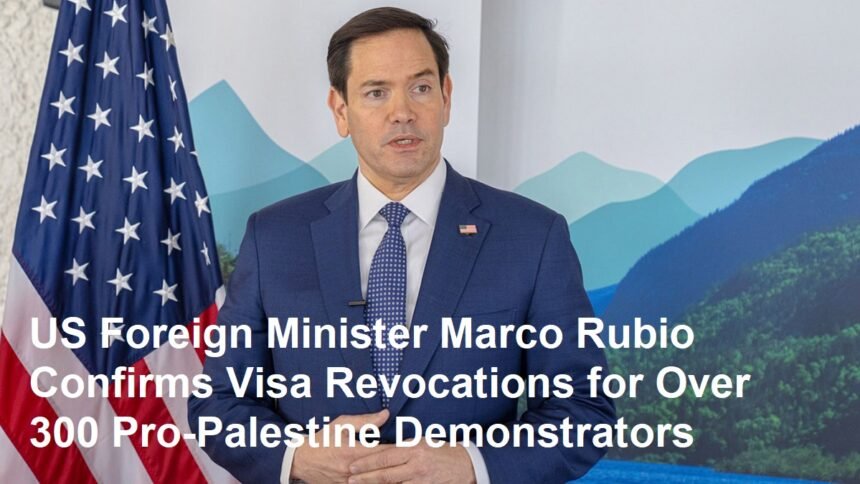In a bold move that has sparked intense debate across political and academic circles, US Foreign Minister Marco Rubio confirmed on Thursday, March 27, 2025, that visas for more than 300 individuals involved in pro-Palestine demonstrations at US college campuses have been revoked. Speaking during his visit to Guyana, South America, Rubio’s statement underscores the US government’s growing concern over national security implications and potential foreign influence in campus activism.
During a press conference held in Georgetown, Rubio detailed the decision as part of a broader effort to safeguard American interests. “Our administration is committed to ensuring the integrity of our immigration process and national security,” Rubio stated. “When we determine that certain activities pose a threat or involve undue foreign interference, we must take decisive action. Revoking these visas is not only about enforcing our immigration laws but also about protecting our institutions and communities.”
The decision comes amid a surge of protests on college campuses across the nation, with several demonstrations organized in support of the Palestinian cause. While freedom of expression and the right to peaceful assembly are fundamental to American democracy, officials have raised alarms over what they describe as instances where protest activities may have been linked to coordinated efforts by foreign entities seeking to undermine US policies or stoke social unrest.
According to government sources, the revocations followed a detailed investigation into the activities of protest organizers and participants. The inquiry, which spanned several months, involved intelligence and immigration agencies that reportedly identified connections between some demonstrators and foreign groups with interests in the Middle East. “Our investigation did not target political opinions per se,” Rubio clarified. “Instead, it focused on actions that appeared to be part of a broader, coordinated effort that could threaten the public order and national security of the United States.”
The announcement has drawn swift reactions from multiple stakeholders. University administrators, while acknowledging the importance of maintaining campus safety, expressed concern over the potential chilling effect on free speech. “Universities have always been a hotbed of political debate and activism,” said Dr. Elena Martinez, president of a prominent US university. “We must balance the need for security with our commitment to upholding free expression. It’s imperative that any actions taken are transparent and do not inadvertently silence legitimate protest.”
Civil rights groups and legal experts, however, have criticized the move as potentially overreaching. Advocates argue that the revocation of visas based on participation in political demonstrations may set a dangerous precedent, one that could curtail the rights of international students and scholars. “Political activism is at the heart of academic life,” commented Amina Khalid, a spokesperson for a national civil liberties organization. “Targeting individuals solely for their political beliefs, without clear evidence of criminal activity, undermines the very principles of democracy.”
In response to such criticisms, Rubio emphasized that the policy is being applied strictly in cases where demonstrators were linked to organized, disruptive activities with potential external backing. “Our focus is on maintaining the rule of law and preventing any form of subversion that might exploit the freedoms of our academic institutions for nefarious purposes,” he asserted.
The revocations are expected to have significant implications for the affected individuals, many of whom are international students or visiting scholars. Immigration lawyers and advocacy groups are closely monitoring the situation, warning that the policy could lead to lengthy legal battles and damage the United States’ reputation as a destination for academic and cultural exchange.
As the debate continues, Rubio’s announcement has already ignited discussions in both Congress and academic circles. Lawmakers are calling for further clarification on the criteria used to identify those deemed a security risk, while university officials urge for dialogue to ensure that campus activism is not unduly penalized.
In the coming weeks, the administration is expected to release additional details about the investigation and the specific processes behind the visa revocation decisions. For now, the measure stands as a stark reminder of the complex intersection between national security, immigration policy, and the fundamental right to protest in the United States.












